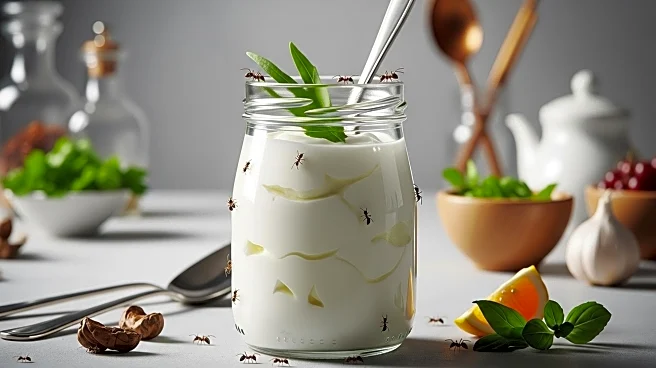What's Happening?
Researchers, in collaboration with Michelin chefs, have successfully recreated an ancient Bulgarian yogurt recipe that uniquely incorporates red wood ants, Formica rufa, as a key ingredient. This innovative approach utilizes the ants' acidic compounds, which are typically used for self-defense, to drive the fermentation process of milk proteins. The resulting yogurt has a slightly tangy taste with mild herbaceousness. The project emerged from discussions with The Alchemist, a Michelin-starred restaurant in Denmark, and involved a field trip to a Bulgarian village where the traditional recipe was learned directly from the local community. The ants contribute formic, lactic, and acetic acids, which aid in yogurt coagulation and fermentation, making them an integral part of the yogurt-making process.
Why It's Important?
This development highlights the intersection of traditional culinary practices and modern scientific exploration, showcasing how ancient methods can be preserved and understood through contemporary research. The collaboration between scientists and chefs not only revives a nearly forgotten recipe but also emphasizes the importance of biodiversity and the role of various organisms in food production. The study underscores the potential for innovative food production techniques that respect cultural heritage while advancing scientific knowledge. It also raises awareness about the complex interactions between humans and other species in food systems, potentially influencing future culinary and scientific endeavors.
What's Next?
While the study provides a fascinating insight into traditional fermentation techniques, researchers advise against attempting this recipe at home due to safety concerns, as ants are not authorized for sale as food products in Europe. The findings may inspire further research into the use of insects in food production, potentially leading to new culinary innovations. The collaboration with The Alchemist has already resulted in the creation of new ant-based recipes, such as an ice cream ant-wich and a milk wash cocktail, indicating a growing interest in exploring unconventional ingredients in high-end cuisine.
Beyond the Headlines
The study not only revives an ancient culinary tradition but also highlights the ethical and cultural dimensions of food production. It prompts a reevaluation of how humans interact with and depend on other species for sustenance, encouraging a deeper appreciation for biodiversity. The research may influence future discussions on sustainable food practices and the integration of traditional knowledge into modern culinary arts, potentially leading to a broader acceptance of insects as viable food sources.









